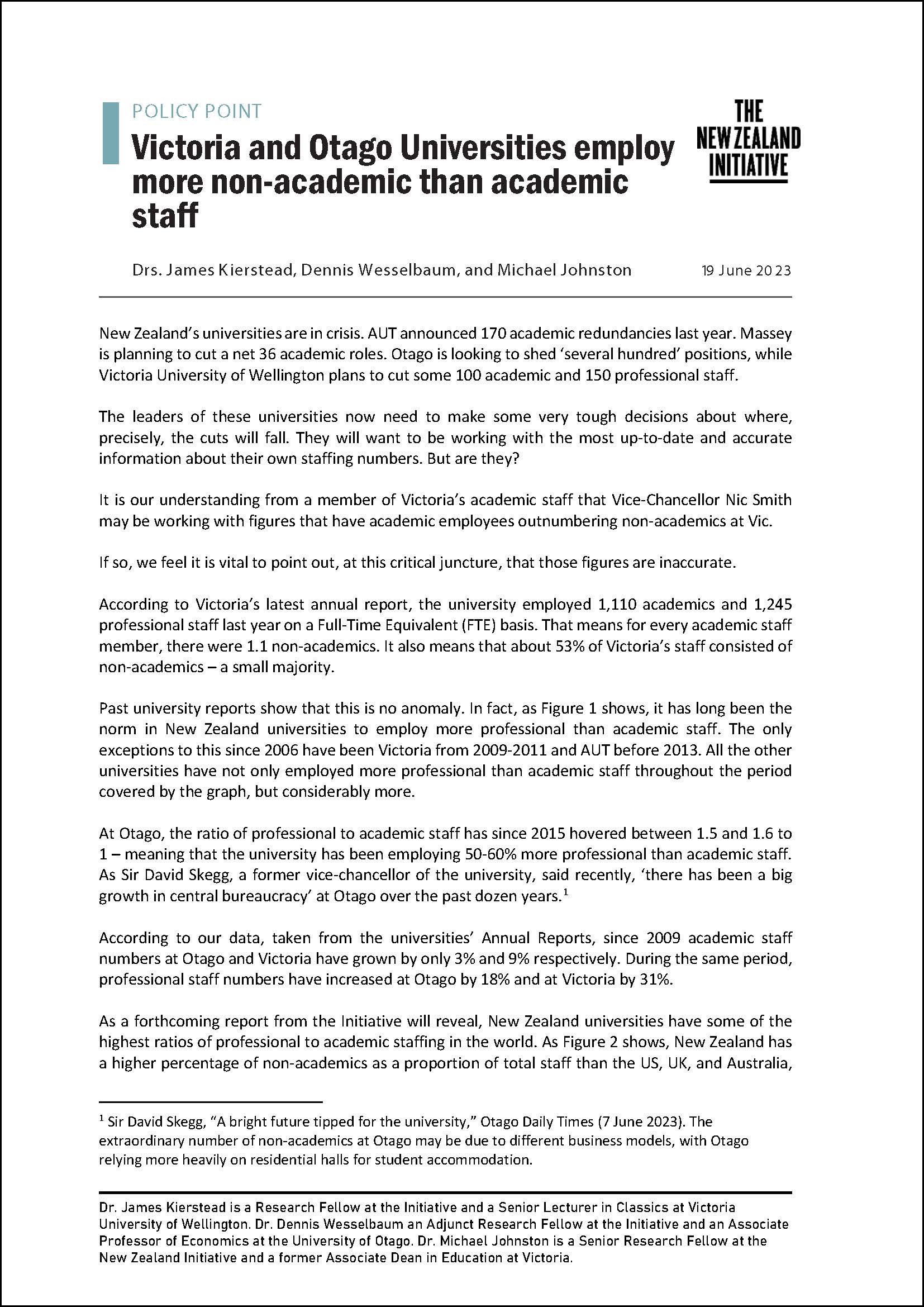.....Victoria and Otago universities employ more non-academic than academic staff
New Zealand’s universities are in crisis. AUT announced 170 academic redundancies last year. Massey is planning to cut a net 36 academic roles. Otago is looking to shed ‘several hundred’ positions, while Victoria University of Wellington plans to cut some 100 academic and 150 professional staff.
The leaders of these universities now need to make some very tough decisions about where, precisely, the cuts will fall. They will want to be working with the most up-to-date and accurate information about their own staffing numbers. But are they?
It is our understanding from a member of Victoria’s academic staff that Vice-Chancellor Nic Smith may be working with figures that have academic employees outnumbering non-academics at Vic.
If so, we feel it is vital to point out, at this critical juncture, that those figures are inaccurate.

Click to read or download PDF
Dr Michael Johnston has held academic positions at Victoria University of Wellington for the past ten years. He holds a PhD in Cognitive Psychology from the University of Melbourne.
James Kierstead is Senior Lecturer in Classics at Victoria University of Wellington.
Dennis Wesselbaum is a Senior Lecturer in Economics at the University of Otago, the Vice President of the New Zealand Association of Economists, Editor-in-Chief of New Zealand Economic Papers and Associate Director of the University of Otago’s Economics PhD Programme.
It is our understanding from a member of Victoria’s academic staff that Vice-Chancellor Nic Smith may be working with figures that have academic employees outnumbering non-academics at Vic.
If so, we feel it is vital to point out, at this critical juncture, that those figures are inaccurate.

Click to read or download PDF
Dr Michael Johnston has held academic positions at Victoria University of Wellington for the past ten years. He holds a PhD in Cognitive Psychology from the University of Melbourne.
James Kierstead is Senior Lecturer in Classics at Victoria University of Wellington.
Dennis Wesselbaum is a Senior Lecturer in Economics at the University of Otago, the Vice President of the New Zealand Association of Economists, Editor-in-Chief of New Zealand Economic Papers and Associate Director of the University of Otago’s Economics PhD Programme.


4 comments:
Reminds me of that excellent documentary series, "Yes Minister", when Hacker was questioning the huge administrative workforce and its cost at a new hospital that had... "no patients!"
But clearly there's more to it than just the ratio of professional to academic staff for, if that was the only relevant metric, AUT should be doing famously? I suspect not, and there's some truth in the saying go woke, go broke. One can't help but feel that things like rebranding; new ethnic-sensitive buildings; and pandering to other woke ideas around the mythical 'ToW principles' and the likes of matauranga Maori, have all played their part in creating this situation. Maybe, less navel gazing and a wider 'real world' perspective is overdue?
There should be nothing like economic hardship and the falling in ranking status and outputs to sharpen the minds of those in charge, but unfortunately we only have to look at our Primary and Secondary education sectors where poor performance continues unabated, without those responsible being held in any way to account.
When we have teenagers leaving school unable to write, read or do simple arithmetic but swing a poi perfectly and dance a really angry haka we know that the education system is totally stuffed. Kiwialan.
Hopefully mostly social studies, humanities and admin to go. Maori Studies should reaain sacrosanct. Unis should run short courses on bus driving.
My concern is that there are overall too many students at Unis. and concentrated into the soft subjects and encompassing subjects that are really trades and technology.
This idea that equity in education, probably from Beeby's legacy, is measured by how many can get to University is foolishness especially when the standards have been lowered to accommodate the numbers.
When I attended Canterbury University in the '70s there were 3,500 students. Now there are 18,000, an increase of about five times. Yet the general population has increased by less than two times.
I am sorry that this isn't on the topic but I think with academia producing so much theory now and in the past that has been and is actually destructive to society I feel despondent about many of the departments existence at all. I would be hesitant about my grandchildren attending them.
They have become as devastatingly dysfunctional like the rest of our education system in every way not just in the ratio of academic and professional staff.
Post a Comment
Thank you for joining the discussion. Breaking Views welcomes respectful contributions that enrich the debate. Please ensure your comments are not defamatory, derogatory or disruptive. We appreciate your cooperation.